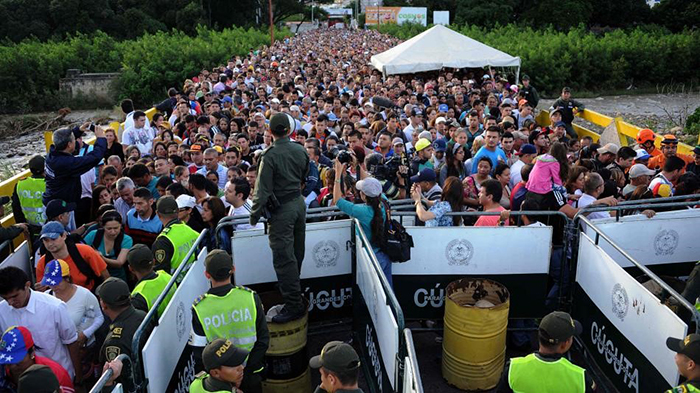Robaird O’Cearbhaill
Hong Kong correspondent
Loving care for the less privileged is required, a moral duty, Pope Francis said on the 2018 World Day of Migrants and Refugees.
Venezuelan refugee migration in the millions is the “largest mass displacement in the world,” behind Syria, the International Rescue Committee’s (ICR) recent report said. When clean water, health, electricity and vehicle fuel supply vanished, expensive food was hard to find, violence was widespread, people fled with only what they could carry. Surprisingly, this used to be a very rich country, with the largest oil reserves, but no longer able to refine them. Once the currency became worthless, basic consumer goods were unaffordable.
The ICR’S recent emergency report stated that “over 94% of Venezuelans have been pushed into poverty due to deteriorating social conditions. Hunger, economic meltdown, violence, among other factors, have led 5.4 million Venezuelans to leave the country.” The largest number, 1.7 million, fled to Colombia.
Christian help and NGOs have been a bulwark against hunger and health. Catholic charity Caritas with widespread social support in the community, and the local archdiocese, the ICR, the Irish poverty and disaster NGO, GOAL, as well as a local church food centre, relieve the many destitute Venezuelan refugees, in the border entry city of Cucuta.
The ICR report press release, International funding necessary to support Colombia’s policy to welcome Venezuelan migrants, outlined that “Colombia continues to face challenges, despite the efforts of the Colombian government to welcome the increasing influx of Venezuelans, including the recent policy to grant legal status for one million people (hundreds of thousands live illegally, avoiding immigration deportation). The pre-existing challenges for Venezuelans have been exacerbated as Colombia has responded to the COVID-19 pandemic, the unemployment rate doubled, reaching 21.9%; estimated that food insecurity would double, with 84% of migrants at risk; and UNICEF reported that 9 in 10 children have not been in school since March 2020.”
Meghan Lopez, the IRC’s regional vice president for Latin America, said: “Venezuelan people are now more vulnerable and scared than ever. As many as 130,000 felt they had no option but to return to their home country, crossing again by foot. The Venezuela crisis is the second largest mass displacement in the world, but has received a fraction of the resources dedicated to other crises of similar scale.” In practical terms IRC helps hospital entry for pregnant women and distributes financial assistance to border area families.
Caritas, and Cucuta’s Bishop, collaborate with a refugee center. Caritas Internationalis Secretary General, Aloysius John, explained Caritas center’s significance “on the meaning of charity in such a challenging context. The Church in Latin America is confronted with one of the worst humanitarian crises of our modern times. It is a peculiar situation, neither a natural disaster nor a situation of war. It is caused by vested interests in politics which are strangling the poor socially and economically, leaving no choice for innocent civilians but to take the road to leave their home lands. Tens of thousands of Venezuelans leave their oil rich nation in search of food and money to ensure their day to day survival. In their desert of misery and hopelessness, Casa del Paso (the refugee center), run by the diocese of Cucuta, bordering Venezuela is an oasis of peace, comfort and compassion for these wanderers who have nowhere to go.”
As an international volunteer, Kirby Trapplino, blogged about another successful Cucuta refugee center, the Christian Church for the Border, which provides meals and hygiene kits to refugees who left “everything behind and traveling with backpacks and suitcases by foot with young children who themselves were also carrying what they could. I was, and still am, at a loss for words to describe what I was faced with in this sea of humanity. Optimism met with fatigue, desperation mixed with smiles of hope, and for some, simply downcast and depleted.”
As Aloysius concluded about his Cucuta trip: “Here we can see how charity inspires everything and charity makes anything possible and it gives hope to those who have lost. It is love and care shared and lived…charity in humbleness to act against the sin of indifference to human suffering which dehumanises us all.”


 Follow
Follow


